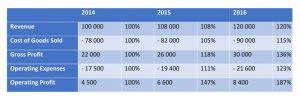
Verify that all tax-related documents are filed correctly and adhere what are retained earnings to accounting standards and industry-specific regulations. By leveraging automation, documentation and reporting processes become streamlined, reducing manual errors and making time more efficient. By integrating automated systems into your audit preparation, you can ensure that your records are consistently accurate and up to date. If you leveraged a subject matter expert, they should also review the draft audit program.
Mailing Address
She has a degree in journalism from the University of South Florida and is passionate about writing and reporting the news. For personalized financial solutions and expert guidance, consider collaborating with MAH Chartered Accountants, who are committed to supporting your business’s success. When teams have clarity into the work getting done, there’s no telling how much more they can accomplish in the same amount of time.
- A well-prepared business not only facilitates a smoother audit process but also helps in identifying and rectifying any discrepancies in financial statements.
- Impetus from internal audit reports can encourage optimization, saving the organization in costs and ultimately improving customer satisfaction.
- Promptly resolving concerns ensures a positive audit outcome and demonstrates your commitment to maintaining high financial management standards.
- Employees responsible for maintaining these records should work closely with auditors to provide any additional information or clarification needed.
- Seeking advice from accounting experts, like those at TGG Accounting, can provide invaluable insights.
- Employers reliant on seasonal or highly skilled immigrant workers must consider these delays when planning staffing.
Step-By-Step Accounting Audit Process

As you can see there is a heavy focus on financial modeling, finance, Excel, business valuation, budgeting/forecasting, PowerPoint presentations, accounting and business strategy. Most people are audited because their tax return is flagged by the IRS computer program. This usually how to prepare for an audit happens when information the IRS has on file such as wages reported by your employer doesn’t match what’s entered on your return.

Preparing for an Audit: Key Steps for Businesses
With TGG Accounting by your side, you’re not just surviving an audit; you’re thriving through it. At TGG Accounting, we stand by our clients, offering guidance and support throughout the auditing process. One of the quickest ways to attract an audit is through excessive or improper tax deductions. In both Canada and the U.S., tax agencies closely scrutinize deductions that seem out of line with your income or industry norms.

During audit preparation, auditors verify the accuracy of financial statements, ensure that documentation is current, and confirm that internal controls are functioning as intended. Before the auditors arrive, it is crucial for nonprofits to conduct a preliminary review of their financial records. This step involves scrutinizing financial statements, budgets, and other relevant documents to ensure accuracy and completeness. Organizations should verify that all income and expenses are properly categorized and that any discrepancies are addressed promptly.
Identifying potential red flags and areas for improvement
- It’s typically conducted by an external entity to ensure accuracy and compliance with accounting standards and regulations.
- Immigration policies continue to shift across successive administrations, and employers must stay agile.
- Financial statements, internal controls, and compliance are three areas of auditing.
- It should come as no surprise that the most important step you need to make in preparing for your audit is to plan ahead.
- This involves a detailed review of the audit requirements, which can vary significantly depending on the industry, regulatory environment, and specific organizational needs.
- Employers play a vital role in addressing workforce concerns and ensuring transparent communication without creating an atmosphere of fear or intimidation.
A financial audit is an essential Law Firm Accounts Receivable Management part of ensuring the accuracy and transparency of your business’s financial statements. While the process can seem overwhelming, proper planning and preparation make all the difference. By understanding the scope of the audit, gathering and organizing your documents, reconciling accounts, reviewing internal controls, and communicating with your auditors, you can streamline the entire process.
Step 10: The Power of Preparation
Instead of asking how the process works, the in-charge internal auditor can validate their high-level understanding by sharing their initial research and due diligence. It is easier for an audit customer to confirm internal audit’s understanding of the process and add color if necessary, as opposed to reiterating information that has been available and already documented. While external regulatory compliance audits are essential, they often have a specific scope and aim — PCI DSS, for example, zooms in on credit cardholder data. Internal audits have the benefit of a looser scope, allowing an organization to focus on priority areas or areas that may not be examined in a formal compliance audit. Preparing for an audit is crucial in ensuring that the company receives an unqualified or clean opinion.

Performing a pre-audit assessment can help identify potential issues before the auditors arrive. This step allows you to double-check your financial statements, transactions, and internal controls. By doing this, you can catch any errors early, giving you a chance to fix them before the auditors spot them. A typical external or internal audit has four stages – planning, fieldwork, reporting, and follow-up. The accounting audit process is designed to ensure that the financial statements are examined thoroughly and accurately, providing stakeholders with confidence in the reliability of the financial information. A comprehensive pre-audit checklist should cover all aspects of your financial operations.
Essential Accounting Tips for New Business Owners
For the audit preparation and audit proper, these employees must be unbiased and objective as possible – acting as third-party investigators all throughout. Their role is to thoroughly assess the company’s internal processes, identify areas of improvement, and provide actionable feedback. By simulating the external audit process, internal auditors help the company refine its systems and improve its chances of passing the external ISO audit. A CPA firm plays a crucial role in streamlining and simplifying audit preparation services. At Braj Aggarwal CPA, P.C., we guide you through the audit process, ensuring clarity on what the audit will cover while helping to organize and verify all financial documents. We provide comprehensive checklists to track necessary tasks and review internal controls to confirm they meet industry standards.

